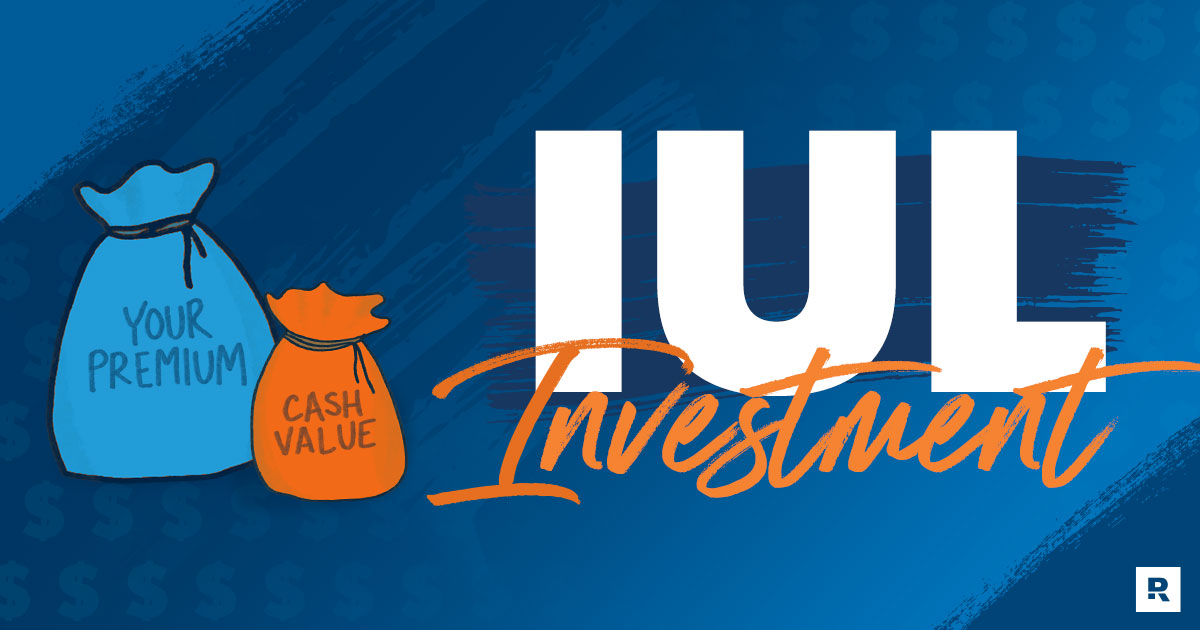Indexed Universal Life Investment: How Does It Compare to Others?
9 Min Read | Mar 17, 2025

Key Takeaways
- Indexed universal life (IUL) insurance is a life insurance policy where some of your money is tied to a stock market index.
- High fees and rising premiums can eat away at the cash value, making IUL an expensive and risky choice.
- Term life insurance is a more affordable and straightforward option for coverage, allowing you to invest separately for long-term growth.
Looking to make a wise investment for your future? Sure you are! So how does indexed universal life (IUL) insurance fit into that? About as well as lighting dollars on fire, that’s how. Yeah, we’re not fans of mashup products that combine two essential services into one ugly disaster.
Compare Term Life Insurance Quotes
To see what’s up with indexed universal life and find out the best way to cover your life insurance needs, read on!
What Is an IUL Account?
Other than being a hot mess, indexed universal life accounts are life insurance policies where some of your money is tied to a stock market index (more on what those are below). With an IUL, premiums go toward paying for two benefits:
- A death benefit: This is a cash payout that goes to your family (or estate) in case the unthinkable happens.
- A cash value account: This is invested in an index fund and can grow based on the performance of a specific stock market index (that’s why it’s called indexed universal life). But hefty fees can put a big dent in any returns you might get from the cash value portion of your policy.
Real talk about the true purpose of life insurance: Its one job is to replace your income for your dependents when you die. And that kind of coverage is way too important to muddle up with complicated riders and cash value accounts. (Don’t worry, we’re also going to talk about better ways to invest for retirement.)
The Basics of IUL Investments
You may be wondering, What exactly happens with an IUL premium? Good question! First, remember those dreaded fees. Hey, insurance companies have to make a living somehow, right? Those fees can be especially draining early on in the life of the policy.
Next comes the cost of your actual death benefit. Once those two things are covered, whatever’s left of your premium goes toward a cash value account. And here’s where the index comes in.
If you’re not familiar, an index is just a list of companies investors use to judge how well the stock market (or sometimes one portion of the market) is doing. The S&P 500 and the Dow Jones Industrial Average are examples of indexes.
Depending on your policy, the cash value will be tied to the performance of a particular index. So if an IUL tracks the S&P 500, for example, the insurance company calculates an interest rate based on the performance of the S&P 500 to pay on the cash value portion of your policy. Sometimes interest is paid out annually, sometimes on other timetables. The interest is supposed to help your cash value grow for the future (whether growth actually happens is another story).
Sounding pretty sweet? That tied-to-an-index part might seem like a safe investment. Think again! The problem with IULs is even after you’ve paid out those hefty fees, what little you contribute toward the cash value usually leads to a very average return on investment (ROI). And when you’re planning your golden years, average just ain’t gonna cut it!
The Ugly Truth About IULs
In a nutshell, an IUL is a gimmicky product that over-promises and under-delivers. Badly. Let’s see more of why.
The indexed universal life insurance marketers will say a policy like this lets you set your own premiums. This is sort of true. For example, if your cash value account is performing well, you can use those earnings to help pay for part of your premiums. But the premiums also can (and likely will) rise without your permission. That’s because the cost of insuring your life goes up as you age. So the so-called earnings in the index-tied cash account are often eaten up when the insurance company charges you more to keep the policy in force.
Plus, no matter how low you set your IUL premiums, the price will never be as affordable as what you’d get with term life insurance. (Spoiler: That’s the only kind of life insurance we recommend, since it’s the cheapest and simplest way to take care of your loved ones when you’re gone.) More on how it compares with IUL below.
You’ll also hear that your IUL investments grow tax-free. That’s true. But it’s also true of several other better forms of investment.
They’ll even tell you that combining coverage with an indexed cash investment is a convenient way to plan your retirement that will pay off down the road. It may feel convenient, but your returns will pale in comparison to growth stock mutual fund investments through your 401(k) or Roth IRA (see below).
That’s the ugly truth about IULs. But how do they compare to other forms of retirement investing? Are they better or worse? We’re about to find out!
Learn the Smarter Way to Do Life Insurance
Life insurance can feel freakin’ confusing. Sign up to get Ramsey’s no-nonsense advice, including free access to Dave’s video from Financial Peace University (normally $80), plus guides and resources sent right to your inbox.
Term Life Insurance vs. IUL
As much as we love investing and life insurance (and we love both), we’d never point you toward any form of whole life or universal life coverage. Both are more generally known as permanent life insurance, and they’re rip-offs—including IULs.
With IULs, the effort to hit two legit goals—saving for the future and replacing your income at death—is blended into one product. The result is that you’ll fall short on one or the other, and sometimes miss both!
But term life? This is gold. Term life insurance keeps coverage cheap and simple. Based on your age, term life companies calculate the average price to insure you for a certain death benefit over a term of 15 or 20 years. Since you’re only going to have the coverage for that long anyway, they can offer it for way less than you’d ever find with an IUL (or any other kind of permanent, or whole life, policy).
Another reason term life beats IUL? Your premium with a term policy will never change. Not only is your cost set in stone, you also avoid the ridiculous fees built into an IUL. Plus, you don’t have to mess with the risk that your cash value could be eaten up by a bumpy stock market! Overall, an IUL just can’t compare to term life as a secure way to replace your income.
Here's some good news. You don’t need life insurance forever! So long as you’re working the Baby Steps plan. Following that path over the years, you’ll become self-insured. (That means you’ll have no debt, no dependents living with you, and no mortgage to pay down. Bye-bye premiums, hello independence!)
Do yourself a favor and skip IULs completely. Buy term life coverage to replace your income, use tax-advantaged retirement accounts to plan your future, and save yourself a bundle on both.
Monthly Estimate
0 - 0
IUL vs. Whole Life
We’re opposed to all forms of permanent life insurance, so this one’s like comparing two kinds of poison. We don’t think you should take either one!
There’s really no way to know how the money in your cash value account will perform in either an IUL or a whole life policy. One thing you can know for sure though—both products will definitely be way, way more expensive than a term life policy. Meanwhile, you could be investing the difference into investment accounts that’ll give you much better returns. Such as...
IUL vs. Roth IRA
This one’s an easy pick: Roth IRA all day long.
First, let’s admit that both an IUL and a Roth IRA allow your investment to grow tax-free. And when you retire, you can withdraw money from either type of account tax-free.
Otherwise, it’s no contest. IULs actually limit how much you can earn on the cash value account. No such limit exists for a Roth IRA (although there are annual limits on your contributions). And of course, the investments in your Roth IRA aren’t limited to the performance of some index fund. You can invest in mutual funds or even real estate through your Roth IRA. Your ROI is going to be way better!
IUL vs. 401(k)
401(k) wins, and IUL loses (again).
All the same advantages of a Roth IRA hold for a 401(k): fewer fees than an IUL, no cap on earnings, and more flexible options on how you can invest your contributions.
IUL vs. VUL
We’re having déjà vu because this is another case of choosing between two real stinkers. We sure don’t recommend IUL, but variable universal life (VUL) probably isn’t any better. What is it exactly? Here’s a breakdown.
As with all the other kinds of permanent life insurance, VULs mix two distinct jobs into one ugly package. And they’re incredibly complicated! Here are the things VULs try to do all at once:
- Be a life insurance policy
- Be a savings account
- Be a mutual fund
By now you know that mutual funds will give you a better return than index funds. So does that make VULs better than IULs? Maybe. But VULs have the same basic problems as IULs: too many cooks spoiling the broth. Your premiums will vary, they could go way up, your ROI will be modest at best, and mutual fund performance could even erase prior earnings over time.
Bottom line: VULs are a terrible product you should stay far, far away from.
As another reminder, the wiser move is to buy a term life policy and invest your savings in mutual funds through retirement accounts like a 401(k) and Roth IRA.
Got Kids? Use These 5 Tips to Get the Right Length of Life Insurance.
If you have kids depending on your income, you might be wondering, How long should my life insurance policy last? Great question!
Insurance Is Not a Wealth-Building Tool
Life insurance was never designed for building wealth. (Doesn’t the name life insurance kind of give that away?) Insurance is protection for an asset you already have. Investments are for building wealth over time.
The same principle applies to life insurance, which only has one job: to replace your income if you die. Will an IUL policy do that? Maybe. But the cost of the policy can’t compare with term life insurance.
Of course, you can and should build wealth for your future to provide for your family. But the smart way to do that is by following the Baby Steps and investing wisely in retirement accounts that were made for that job.
Life Insurance Calculator
You can get an idea of how much you need (and save some brain calories while you’re at it) by using this quick life insurance calculator.
If you’re in the market for new life insurance or want to talk to an expert, we recommend RamseyTrusted partner Zander Insurance. Don’t let another day go by without being protected.
Get your term life insurance quotes today.



